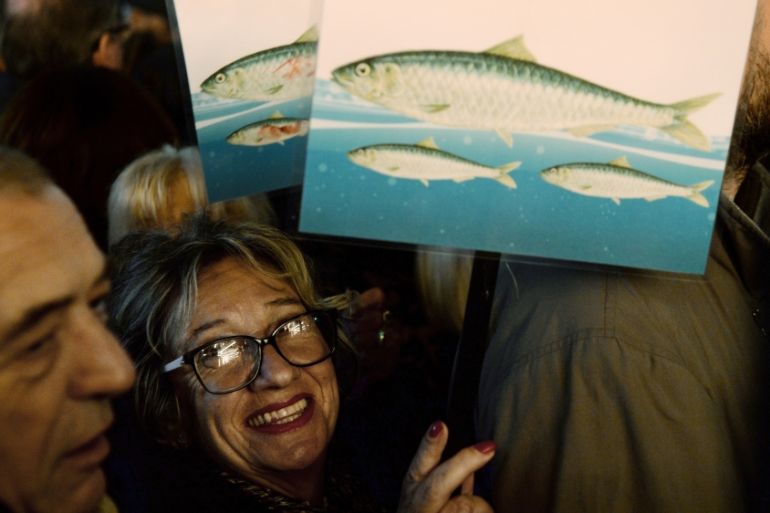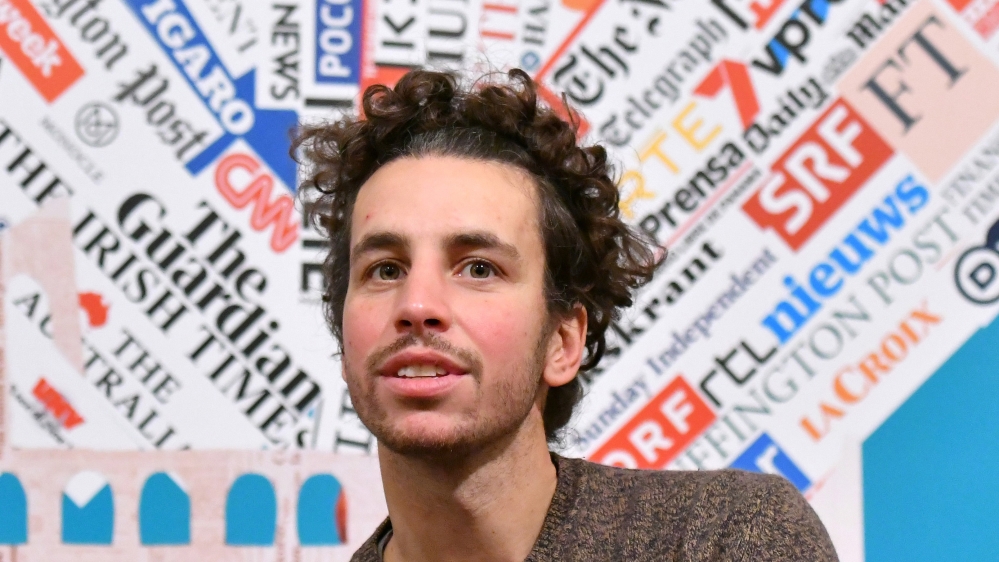Italy’s anti-fascist Sardines rally to counter rising nationalism
Large anti-Salvini protest planned for Rome after several successful demonstrations by movement founded by flatmates.

Rome, Italy – On the evening of November 14, Matteo Salvini, leader of the far-right League party, was in Bologna to kick off his campaign for January’s regional elections.
The area has been a left-wing bastion since World War ll, but polls put the League neck-and-neck with the incumbent centre-left Democratic Party.
Keep reading
list of 4 itemsGermany bans far-right Austrian nationalist Martin Sellner from entry
Australian efforts on Islamophobia flag despite Christchurch wake-up call
Norway court says mass killer Breivik’s prison isolation not ‘inhumane’
Bolstered by a recent win in Umbria, another leftist stronghold, Salvini arrived in Bologna to support League candidate Lucia Borgonzoni, and to address the 5,000 supporters waiting for him in the city’s sporting arena.
In triumphant tones, Salvini promised to “liberate” the region from the left. To the League, the election was as good as won.
But close by, thousands of people braved an autumnal downpour and filed into Bologna’s main square, squeezing in like sardines. They carried homemade placards in the shape of fish, sang anti-fascist anthem Bella Ciao, and stood together to oppose Salvini’s divisive rhetoric.
The “Sardines” movement was born.
The protest was the idea of four former flatmates, who, tired of the apathy that has characterised Italian political participation in recent years, decided it was time to act.
“We knew that the sports arena where Salvini was rallying could hold a maximum of 5,700 people, so we decided to try and get 6,000 people in Piazza Maggiore, so we could show that there are more of us,” Andrea Garreffa, one of four founders of the movement, told Al Jazeera.
Close to 15,000 people turned up.
“Salvini said that we had to be liberated from the left, and this is a very sensitive topic here. Emilia Romagna was already liberated from dark powers at the end of the second world war, so people reacted to that,” said Garreffa.
The four young founders thought there may be more protests across the region, but the movement has been unexpectedly far-reaching. Over the past month, people have gathered in cities across Italy, and as far away as London, New York and Berlin.
The movement’s biggest event is planned for Saturday in Rome.
Political party placards and other signs of political affiliation are banned from the protests. The aim is to foster inclusivity and tolerance.
“Although the movement was born in a very specific context – to counter the League’s campaign in Emilia Romagna – the fact that it has spread so easily means that our messages respond to a very real need for Italians, a need to fight divisive political language, a need to go back to debating things that are important, rather than being immediately confrontational” said Garreffa.

According to Francesca Forno, professor at Trento University and expert in social movements and civic participation, timing was a major factor in the Sardines’ success.
“The Sardines encountered a favourable cultural climate, which has been saturated with the language of fear.”
Salvini, who is being investigated for abduction and dereliction of duty for refusing to allow 164 migrants to disembark from an NGO rescue vessel in August 2018, rose to power by combining right-wing populism, anti-immigration rhetoric and the savvy use of social media.
As interior minister, he refused docking rights to NGO ships, leaving hundreds of people at sea, and pledged to conduct a census of the Roma community.
He also introduced a much-criticised ‘security bill’, which criminalised the activities of NGO vessels, and further stoked hatred towards immigrants.
His popularity continued to soar in economically depressed Italy, and he seemed invincible. But a major miscalculation thwarted his ascent last summer, when he willingly caused a government crisis, hoping to spark elections that he would likely win.
Unexpectedly, two rival parties, the Democratic Party and Five Star Movement, formed a coalition, and Salvini found himself on the sidelines.
But being in opposition has not damaged his standing: recent polls show that Salvini would still stand a good chance of becoming prime minister if elections were called, and a right-wing coalition of the League, Forza Italia, and Brothers of Italy would obtain a comfortable majority.
Does the grassroots, non-partisan Sardines movement stand a real chance of stopping Salvini?
“I don’t think the Sardines can be a real enemy for Salvini,” said Professor Forno, “but they have made visible a part of Italy that does not share the populist and xenophobic politics represented by Salvini. They shattered the feeling of loneliness among people who suffered, helplessly, through a very violent period of Italian politics, during which NGO ships carrying exhausted migrants became hostage to a perpetual electoral campaign.”
In recent years, Italy has seen many movements grow from the streets and quickly disappear.
Despite its rise, the Sardines’ future is far from certain. Yet, their anti-populist messaging, and their plea to return to moderation and tolerance have struck a chord.
“More than anything, the movement has brought back hope,” says Garreffa, “and shown people that if all of us get off the sofa and participate in politics, we can make a difference. Alone, we are powerless, but together we have a voice.”